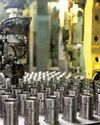The leading earthmoving and construction equipment manufacturer JCB India invested in expanding its manufacturing capacities to beat the slowdown, says MD and CEO Vipin Sondhi to Ashish Sinha.

The earth moving and construction equipment (ECE) industry is back on track. What is driving its growth?
This growth in the ECE industry is primarily driven by the roads and highways sector. This growth in the sector needs to be sustained, and a lot depends on the execution of the projects that are being announced. Also, sustainable revival led by only one sector is not adequate. In addition to roads and highways, other sectors also needed focus, which seems to be addressed by Budget 2017–2018, with irrigation and railways getting significant outlay.
What were the main reasons responsible for the downturn?
The ECE industry is dependent on projects, mainly infrastructure for growth. The overall economic slowdown and delay in infra projects led to low confidence amongst builders, developers, contractors and other stakeholders, resulting in delay in construction projects. These coupled with land clearance issues and acquisition delays, affected the overall demand for construction equipment.
How did the downturn affect JCB? Can you specify in terms of revenue, production and profit (or loss)?
We, at JCB, were adversely affected due to this down cycle. However, we invested in creating capacities and expanding our manufacturing base, products, and product support network. This was done to be able to cater to demand as it picked up, which it has by over 40 per cent in 2016.
This story is from the {{IssueName}} edition of {{MagazineName}}.
Start your 7-day Magzter GOLD free trial to access thousands of curated premium stories, and 9,000+ magazines and newspapers.
Already a subscriber ? Sign In
This story is from the {{IssueName}} edition of {{MagazineName}}.
Start your 7-day Magzter GOLD free trial to access thousands of curated premium stories, and 9,000+ magazines and newspapers.
Already a subscriber? Sign In

MEMORIES & IMPRESSIONS
Ratan Tata was an exceptional human being. He was a visionary leader, esteemed industrialist, and a humanitarian, who left an indelible mark on India and the world.

The Robotaxi Market
The robotaxi market is shaping up to be a high-stakes battleground as tech giants and automakers race to transform urban mobility.

And the Nobel Prize Goes to AI
The recent Nobel Prize T awards to AI pioneers affiliated with Google have sparked a broader conversation about Big Tech's influence on research and the limitations of traditional prize categories.

Ola Electrified
Once considered a trailblazer in India’s electric vehicle (EV) ecosystem, Bhavish Aggarwal’s Ola Electric now faces a major accountability crisis.

Sharp Slide in Industrial Output on Eve of Deepavali
India’s index of industrial production (IIP) saw a sharp reversal in August, contracting by 0.1 per cent, in stark contrast to the 4.7 per cent growth in July, mostly because of significant contractions in mining and electricity generation.

Heralding the Solar Era with Sustainable Electrification
RAJEEV KASHYAP on the economics of solar power, the hurdles in scaling it, and much more

A WELL-GREASED MACHINE
The OmniBook X14 laptop runs on first-generation Snapdragon X Elite, which bets big on Al-enabled productivity and battery life, but falls short when it comes to overall experience, says Deep Majumdar

DO NOT LETA HEALTH CRISIS RUIN YOUR FINANCIAL HEALTH
For a family of four living in a metro, it is recommended to opt for a family floater health insurance plan with a sum insured of at least Rs 15-20 lakh

Disruption Ahead: Beyond Organisation Charts and Structures
ALBERT EINSTEIN FAMOUSLY said, “We cannot solve our problems with the same thinking we used when we created them.

Dr. Rahul Shivajirao Kadam: A Visionary Leader Blending Sustainability, Innovation, And Social Empowerment
We are on the stage of global warming, and these technologies not only help prevent further damage but also leave behind a better environment for future generations.